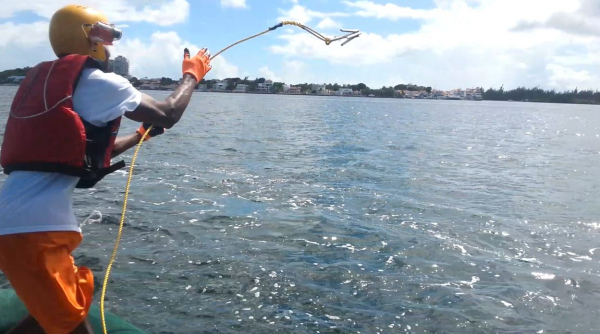Extending the global whale entanglement response network – IWC training in St Martin, November 2013
The latest IWC entanglement response network workshop concluded successfully on 14 November. The three-day event was the second run jointly by the IWC and the UN Environment Programme-Specially Protected Areas and Wildlife (SPAW). The training was hosted by the SPAW Regional Activity Center for the Caribbean and supported by a number of government agencies and NGOs. Attendees included representatives of the regional marine parks and experts nominated by their country's IWC Commissioner and SPAW contact.
The workshop began by looking at different human impacts on whales (for example entanglement and ship strike). Dr Michael Moore,an international expert based at Woods Hole Oceanographic Institution led training in forensic determination of cause of death on stranded whale carcasses. Accurate cause of death data from around the world help scientists assess the extent of entanglement and other human impacts.
This was followed by two days of entanglement response training, starting in the classroom and on land. Sessions covered local and global context, legal issues, tools, techniques and safety protocols. Led by David Matilla of IWC/NOAA and Doug Sandilands of the Center for Coastal Studies (Provincetown, USA), the group also discussed the ultimate goal of preventing entanglements occurring in the first place.
On day three, four Navy boats were deployed and each instructor used one as 'whale,' towing rope and debris to simulate entanglement, and one to conduct the 'rescue,' putting the theory into practice. The rescue boats contained one instructor and two trainees at a time, and twenty participants were able to test out the techniques on the water. The remainder observed from the 'whale' boats.
The twenty trainees were evaluated by the trainers and a small number selected as demonstrating strong enough skills for immediate lead roles in entanglement response teams. The IWC-SPAW training team were able to leave the two basic tool kits used during the training, and they will be augmented with other other necessary equipment and placed strategically in the region.
The next entanglement response workshop is taking place in the Biosphere Reserve of the San Ignacio gray whale breeding lagoon in Mexico and will complete the network in Mexico.
For photographs of the St Martin training, and other entanglement workshops, click here.

